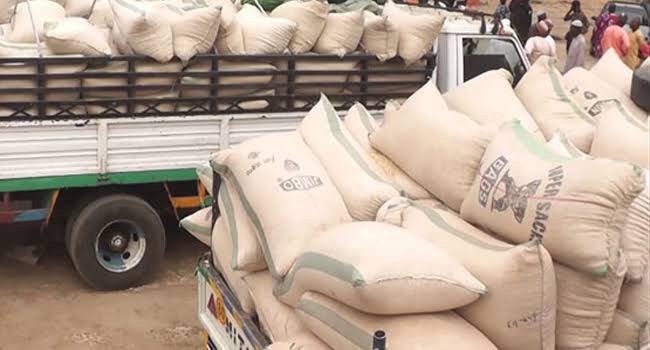As a temporary response to the nation’s growing food crisis and the rising price of commodities, President Bola Tinubu, on Thursday, ordered the immediate release of more than 102,000 metric tons of various grain types from the Strategic Reserve and the Rice Millers Association of Nigeria.
This was the government warned that those hoarding foodstuffs would be dealt with.
The Minister of Information and National Orientation, Mohammed Idris, revealed this to State House Correspondents after the final leg of three meetings of the Special Presidential Committee on Emergency Food Intervention at the Aso Rock Villa, Abuja, on Thursday.
Deliberations began on Tuesday after angry youths and women took to the streets of Minna, the Niger State capital and Kano to protest what they described as the rising cost of living in the country. Similar protests also erupted in Ondo State.
After the first meeting, the Federal Government, said it was “very concerned about what Nigerians are going through, especially with what happened in Minna.”
It said it was “taking some action to ensure that Nigerians have some relief in terms of the availability of food on the table.”
Divulging arrangements agreed upon at the final session, Idris said, “The first one is that the Ministry of Agriculture and Food Security has been directed to release about 42,000 metric tons of maize, millet, garri and other commodities in their strategic reserve so that these items will be made available to Nigerians; 42,000 metric tons immediately.
“The second one is that we have held meetings with the Rice Millers Association of Nigeria. Those who are responsible for producing this rice and we have asked them to open up their stores.
“They’ve told us they can guarantee about 60,000 metric tons of rice. This will be made available and we know that is enough to take Nigerians the next month to six weeks, perhaps up to two months.”
Idris revealed that the administration would resort to importing necessary supplies to augment shortages observed after the release of the food items.
“Now, the third item is that government is also looking at the possibility, if it becomes necessary, as an interim measure in the short run also to import some of these commodities,” he revealed
The goal of the assorted measures, Idris said, was “to crash the cost of these food items. And these are measures that will happen immediately.”
He said, “42,000 metric tons from the strategic government reserve, about 60,000 metric tons of rice from the Rice Millers Association, they have them in all their storage facilities and government, in conjunction with them after this exhaustive meeting, has directed that they also bring this out immediately so that the price of rice will come down significantly.
“These are all measures taken to bring down the cost of food items immediately.”
The FG also revealed plans to inject a yet-to-be-disclosed amount of capital into dry-season farming to ensure a year-round food supply.
Idris explained: “There is a directive to the Federal Ministry of Agriculture and Food Security to invest massively in conjunction with Nigerian farmers and other producers so that we can have a better season coming up shortly.
“We all know that dry season farming is happening, which will take effect very shortly. And that, we hope, will also contribute because as soon as the dry season farming gets underway, the government hopes that food prices will also come down.”
The Minister, who declined to mention specifics, affirmed the FG’s readiness to take punitive measures against those he called food “hoarders.”
Lamenting what he insinuated to be a man-made food crisis, Idris said, “Now the government is also looking at all those hoarding these commodities because these commodities are available in the stores of many traders.
“Government is appealing to them, that they should open up these stores, make these commodities available in the interest of our nation. There is no point when the whole country is looking for this food; you are locking up these products so that you make more money and then Nigerians suffer.”
He threatened those hoarding grains, saying the Federal Government would not fold its arms and watch matters deteriorate.
“You cannot hold the nation to ransom.
You cannot hoard these commodities in your stores when we all need them.
We are in an emergency and we’ll take emergency measures to make sure that this food is available to Nigerians.
“We know where all these major traders are.
“And if they don’t respond by bringing these commodities to the market, the government will take appropriate measures to ensure that these products are made available to Nigerians,” he said.
Asked about the stipulated selling price of these commodities, the minister replied, “Yes, the government has looked at that and what I can tell you is that whatever the government will do to ensure that this food is made available to Nigerians at an affordable cost, the government will do that.
“The President has directed that whatever it will take, food will be available to Nigerians at a cost that is also very reasonable. And that is what the summary of this meeting entails.”
Meanwhile, there was a fresh protest in Kano State on Thursday over high cost of food items and other essential commodities.
Hundreds of Kano residents on Thursday evening took to the streets around Kurna, Rigiyar Lemu and Bachirawa areas along the popular Katsina Road, lamented that the economic situation was getting worse day by day.
Speaking in Hausa language on behalf of the protesters, Usman Bello of Rijiyan Lemo, said the harsh economic situation had caused untold hardship for masses in the state.
“We masses voted for President Bola Ahmed Tinubu, it would not be good of him not to listen to our complaints and address the pathetic economic situation we were facing.
“To pretend that all is well is dangerous; those people closer to Mr. President should tell him the truth, that the masses are suffering and dying of hunger,” he said.
